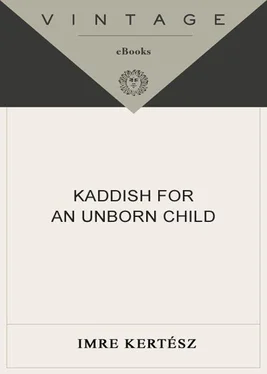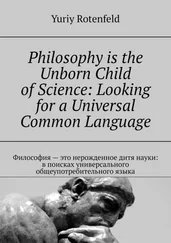
Kaddish for an Unborn Child
by
Imre Kertész
“… streicht dunkler die Geigen dann steigt ihr als Rauch in die Luft dann habt ihr ein Grab in den Wolken da liegt man nicht eng”
Celan: Todesfuge
“… more darkly now stroke your strings then as smoke you will rise into air then a grave you will have in the clouds there one lies unconfined”
Celan: Death Fugue
[1] Translation by Michael Hamburger (Selected Poems of Paul Celan, Anvil Press Poetry, 1995; Penguin Books, 1996)
Imre Kertész, who was born in 1929 and imprisoned in Buchenwald as a youth, worked as a journalist and playwright before publishing Fatelessness , his first novel, in 1975. He is the author of Looking for a Clue, Detective Story, The Failure, The Union Jack, Kaddish for an Unborn Child , and Galley-Slave’s Journal. He was awarded the Nobel Prize for Literature in 2002. He lives in Budapest and Berlin.
A Note About the Translator
Born in England in 1947, Tim Wilkinson first began translating from Hungarian after living and working in Budapest during the early 1970s. He has translated a number of works of history, including Éva Balázs’s Hungary and the Habsburgs 1765–1800 , Domokos Kosáry’s Hungary and International Politics in 1848–1849 , and Viktor Karády’s The Jews of Europe in the Modern Era , as well as literary works by many contemporary Hungarian prose writers.
Kaddish for an Unborn Child
"No!” I said instantly and at once, without hesitating and, virtually, instinctively since it has become quite natural by now that our instincts should act contrary to our instincts, that our counterinstincts, so to say, should act instead of, indeed as, our instincts — I’m joking, if this can be regarded as a joking matter; that is, if one can regard the naked, miserable truth as a joking matter, is what I tell the philosopher approaching me, now that both he and I have come to a halt in the beech wood, beech coppice, or whatever they are called, stunted and almost audibly wheezing from disease, perhaps from consumption; I must confess to being a dunce about trees, I can recognize only pine trees instantly, on account of their needles — oh yes, and plane trees as well, because I like them, and even nowadays, even by my counterinstincts, I still recognize what I like intuitively, even if not with that same chest-thumping, gut-wrenching, knee-jerking, galvanizing, inspired, so to say, flash of recognition as when I recognize things I detest. “I don’t know why it is that every time everything is different in every respect with me, or perhaps if I do know, it’s simpler that I know without knowing it. That would spare me a lot of explanations. But, it would seem, there is no getting around explanations, we are constantly explaining and excusing ourselves; life itself, that inexplicable complex of being and feeling, demands explanations of us, those around us demand explanations, and in the end we ourselves demand explanations of ourselves, until in the end we succeed in annihilating everything around us, ourselves included, or in other words explain ourselves to death,” I explain to the philosopher with that compulsion to speak, to me so abhorrent and yet irrepressible, that always grips me when I have nothing to say for myself — and that, I fear, has roots in common with the stiff tips that I hand out in brasseries and taxis, or bribing, etc. official or semiofficial personages, along with my exaggerated politeness, a politeness exaggerated to the point of self-denial, as if I were continually apologizing for my existence, for this existence. For heaven’s sake! I had simply set off for a walk in the woods (even if it is only this meager oak wood) in the fresh air (even if the air is somewhat putrid) to blow the cobwebs away (let us put it that way since it sounds good, as long as we don’t look too closely at the meanings of words, because if we do look, then the words have no meaning at all, do they? since I don’t have any cobwebs that need blowing away, quite the contrary, I am exquisitely sensitive to drafts); I am (was) spending my time here, fleetingly (and I will not digress here on the digressions that this word offers), in the lap of this mediocre mid-Hungarian hill range, in a creative writers’ retreat — one might call it a holiday home, though it also does for a workplace (for I am always working, being driven to this not just by the need to make a living, but because if I were not working I would be existing , and if I were existing I don’t know what that would drive me to, and it is better not to know, although my bones, my guts have their hunches, to be sure, since the reason I work incessantly is that as long as I keep working, I am, whereas if I didn’t work, who knows whether I would be or not; so I take it seriously, and I have to take it seriously because a deadly serious association is sustained between my sustenance and my work, that is perfectly obvious); so anyway, in a house where I had gained the right of admittance into the illustrious society of intellectuals of my ilk, whose paths for that very reason I can in no way avoid crossing, for all my soundless lying low in my room — the secret of my hiding place betrayed at most by the muted tapping of my typewriter — and for all my scurrying about on tiptoe in the corridors, one has to have meals, yet then table companions surround me with their relentless presence, and one has to take strolls, yet, smack in the middle of the woods, who should I find coming the other way, in his very own stocky and incongruous self, in his brown-and-beige-checked cap and his loose-fitting raglan overcoat, with the narrow slits of his whey-colored eyes and his big, soft, kneaded and already risen dough face, but Dr. Obláth, the philosopher. That is his regular civilian occupation, as attested, incidentally, by the relevant entry in his identity card — to wit, that Dr. Obláth is a philosopher just like Immanuel Kant or Baruch Spinoza or Heraclitus of Ephesus, just as I myself am a writer and literary translator, and the only reason I do not paint myself in an even more ridiculous light compared with the giants who can be marshaled behind the banner of my craft, giants who were genuine writers and, in some cases, genuine literary translators, is because I look ridiculous enough as it is having this as my profession and because my activities as a literary translator nevertheless invest my efforts at keeping myself occupied with some semblance of objectivity and, possibly, in some people’s eyes — above all, in the eyes of the authorities and, albeit for different reasons, of course, in my own eyes too — of a verifiable profession.
“No!” something had bellowed and howled inside me, instantly and at once, when my wife (though as it happens long since not my wife) first made mention of it — of you— and my whimpering abated only gradually, yes, actually only after the passage of many long years, into a gloomy weltschmerz, like Wotan’s raging fury during the renowned farewell scene, until a question assumed ever more definite form within me, emerging as it were from the mist-shrouded figurations of stifled string voices, slowly and malignantly, like an insidious illness, and you are that question; or to be more precise, I am, but an I rendered questionable by you; or to be even more precise (and Dr. Obláth, too, broadly agrees with this): my existence viewed as the potentiality of your being
Читать дальше













